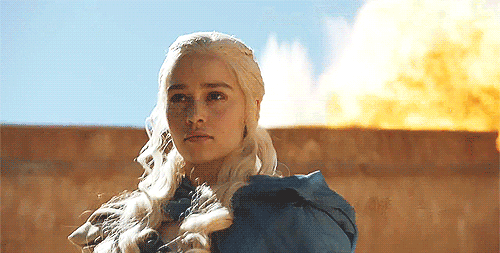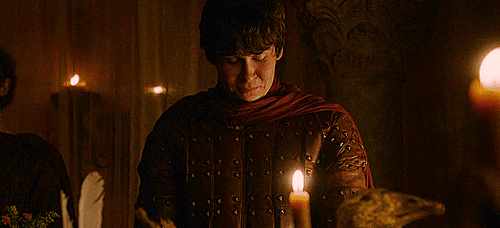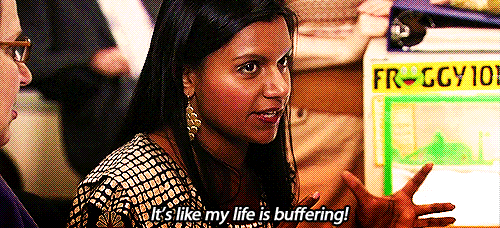Game Of Thrones’ Long Game, And The Problem With Adaptation
The next installment of our weekly Game Of Thrones column. Yes, there will be spoilers.

This week’s Game Of Thrones column deals with some things that have happened in both the series and the books (up to Book 3, A Storm Of Swords), and makes mention, very vaguely, of the fact that some current storylines have repercussions much further down the road, and sometimes people die. We don’t consider any of it to be substantially spoilery, but militant anti-spoiler purists might — so proceed with caution.
–
This week’s Game Of Thrones is, indeed, a chaotic stew of awesome and grim and awesomely grim. Fire! Blood! Snow! Sand! Men in crates with their mouths sewn together! Girly chats on a hill! Podrick is still a sex god for some reason! But as I watched, my mind was occupied with other things.
I knew Daenerys’ brilliant turnabout on the Astapori slave masters was coming, and was wondering how on earth they were going to fit in such an epic setpiece with only five minutes to go, and whether they were going to get it “right”. It’s up there with the Battle of the Blackwater as one of the most memorable scenes in the novels and the series alike; they are huge victories for characters who are constantly underestimated by those around them, with the added bonus of being literally awesome action sequences.

But as happened with ‘Blackwater’, I was left strangely cold, even as my Facebook feed lit up with news of everyone’s boner for Emilia Clarke and her steely gaze. It was beautifully shot; the ‘O Captain my Captain’ moment with the spears was a nice addition by the writers; and the dumbfounded looks on everyone’s faces — from Jorah to the super-punchable slavemaster Kraznys — were delicious. Unlike ‘Blackwater’ (which cost an extra $2.5 million to make and still had to lose elements to which Martin and readers were particularly attached), the scene is basically shot as it was written. Perhaps, then, the only thing standing between me and a dragon boner is the fact that I knew exactly how it was going to go down.
Spoiler Alert: Everything So Far
The difference in the Game Of Thrones viewing experience between readers of the series and non-readers is so great that nerd haven and recap juggernaut The AV Club is running two parallel columns on it – one for each group, and both preceded by a litany of spoiler-protection guidelines every week, according to whether viewers have read all the books or just the ones roughly corresponding with the existing seasons.
Of course, even discussions with rules and careful spoiler warnings are fraught with danger and confusion, because the timeline of the books is all over the shop. Theon isn’t even in the third book, except for one passing mention of the unfortunate situation he’s in; the truncated storyline given to him for the third season happens at the end of Book 2, A Clash of Kings. The uprising against the slavemasters happens about two-fifths of the way into Book 3, A Storm Of Swords; the very next chapter is a Sansa one, and at my best guess that bit’s at least three or four episodes off. Hoster Tully’s funeral doesn’t come until several chapters after that. Books 4 and 5 play out over roughly the same amount of time, but focus on two different sets of POV characters (Martin was forced to do this because otherwise the book would have been literally over 2000 pages – also keep in mind that this seven-book series was originally intended as a trilogy.)
Spoiler Alert: Double Fakeout!
In the last couple of episodes, there’s been a maddening tension between what I “know” is going to happen, when they’re going to show it, and what it’ll look like when they do. When Jaime and Brienne were discovered in flagrante de-fighto by a character who doesn’t appear in the books, for example, it basically set off a new timeline where the hand-choppin’ may or may not have been a factor. It still happened, but for a different reason, at a slightly different time, and with a different weapon. I had girded my loins for awful things to happen with Theon, and he wasn’t the only one who was expecting some form of reprieve when his “rescuer” arrived – this was new, and for a brief few minutes I too was hoping he’d actually made it out.
So many of the noticeable changes in the series, in fact, seem engineered precisely to make readers feel like a particular storyline might dial down the grimness for TV audiences, only to stomp down on our hearts twice as hard. Anything that’s new to readers is, then, either a prelude to a stomping, just a quicker way of getting to a certain point (Robb’s wife being from Volantis instead of a minor Westerosi house, say), or probably not remotely important in the long run. And don’t even think about the series being able to take those new elements and do something interesting with them! Robb’s wife in the books is a mousy cipher, so Talisa can only have so much agency, despite being characterised as strong-willed and clever; and I’m afraid Podrick Payne’s magic wang isn’t a major plot point in the books, despite the fact that the King’s Landing characters have spent more time discussing it this season than the upcoming royal wedding.

Spoiler Alert: All Men Must Die, Eventually
This is also massively frustrating because those of us who have devoured the books already not only know who all the minor sons of House Flamberthing are and who their grandpappys face-maced back in the day — and have our own crazy theories about Jon Snow’s mother, thank you very much — but also, we know where the current TV storylines are going. We know more or less exactly where the conversation between Littlefinger and Sansa on the pier in the first episode leads; we know the next five things Dany’s going to do; we know who dies this season. George RR Martin is playing a very, very long game here and, much as Harry Potter screenwriter Steve Kloves had to consult closely with JK Rowling from day one to ensure compatability with the end of Deathly Hallows, the series has to incorporate plot elements that won’t be fully revealed or even seem relevant until we get our paws on book seven (which is titled A Dream Of Spring and, at the rate things are going, is due out some time after season eleven of the series wraps).

So we readers — even as we enjoy the lush production design, smirking Dinklage and perky, natural breasts of HBO’s biggest series — are also trying to guess where each slice of each episode fits in the timeline, and which bits of our favourite bits might be dropped next in the name of a more concise narrative. If you’re feeling that way, it’s not necessarily because you’re a scary mega-fan, ready to take to the internet at a moment’s notice to scream bloody murder at the excision of some minor element; but because we’re at two different places in two parallel, very similar stories.
The TV show has an authority to it, bestowed by its cultural dominance – Dinklage was in Playboy, and you hum the theme song as you root around in the Tupperware drawer – but the books have the authority of the source material, sneering down at their celluloid offspring from a pedestal made of brick-sized books.
As the show continues to set its own pace and plot while being tied down (sometimes to its detriment) to the plot of the books as well as budget constraints, Messrs Martin, Benioff and Weiss might want to consider letting it roam free a little more. Readers might whine, but at least we’ll be surprised.
—
Caitlin Welsh is a freelance writer. She has written for The BRAG, Mess + Noise, FasterLouder, Cosmopolitan, TheVine, Beat, dB, X-Press, and Moshcam.
You can follow Game Of Thrones with her here.